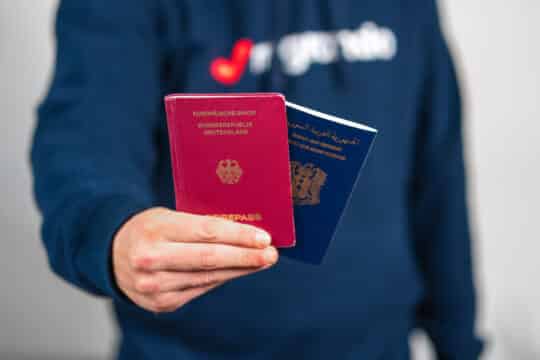Term specialists and history
The reasons for the new Skilled Immigration Act are closely linked to the meaning of the word skilled workers and the history of foreign skilled workers in Germany. At the same time, the necessity and importance of foreign skilled workers for the future in Germany can also be derived from this. The Skilled Immigration Act is intended to function as a key to this.
Definition of the term skilled workers
According to the Digital Dictionary of the German Language, a specialist is a person who has acquired a special skill through professional, additional or academic training. Specialists are therefore people who are experts in a particular field and have a certain level of expert knowledge as a result of their studies, training or further education.
As a specialist, you have a highly respected position within the company. You are an expert and contact person for a specific area and therefore have a great responsibility to apply and communicate your expert knowledge as a specialist.
Previous immigration of skilled workers to Germany
The immigration of foreign workers to Germany is nothing new. As early as 1955, the then Federal Government concluded an agreement with Italy on the immigration of workers.
In the years that followed, similar agreements were concluded with Turkey, Spain, Greece, Portugal, Tunisia, Morocco, South Korea and Yugoslavia. These workers began working in industry in the early 1960s and settled in Germany. The term guest worker developed.
In order to combat the ongoing demographic change and the shortage of skilled workers, Germany has made repeated attempts over the last 20 years to reach agreements with countries to make it easier for skilled workers to immigrate.
A special change was initiated in 2000 with the reform of the citizenship law, which was intended to make it easier for the children of foreigners in Germany, and the plans of the then Federal Government for an immediate program to support the need for skilled workers in the IT sector.
The new Skilled Immigration Act is intended to be a further step in this direction and, according to the Federal Government, will play an important role in the further development of sectors suffering from a shortage of skilled workers.
Naturalization as a specialist?
Background to the Skilled Immigration Act
The reasons for the Skilled Immigration Act are of different nature and have different causes. The ideas and concepts of the new law are also linked to these causes. The same applies to the goals that the Federal Government wants to achieve with the new Skilled Immigration Act.
Demographic problem in Germany
Statistically speaking, the German population is getting older and older and the baby boomers will be retiring in the next few years. This trend has been observable for the past 10 years. For this reason, it is important to use the demographic problem to combat the resulting shortage of skilled workers.
For some time now, the respective federal governments have been working on different ideas to solve this problem and stop this negative trend in Germany, which is also affecting the German economy.
Aim of the law
According to the German government, the new Skilled Immigration Act is intended to help solve the problem of the shortage of skilled workers. The aim is to remedy this shortage through further training and education for domestic skilled workers and through the immigration of foreign skilled workers.
According to an article on the federal government's website, the aim is to use a combination of both ideas to stem the decline in qualified skilled workers and make Germany an attractive business location for foreign skilled workers.

Basics of the Skilled Immigration Act
The aim of the Skilled Immigration Act is to lower the barriers for skilled workers to immigrate to Germany. There are various planned changes to facilitate immigration. These innovations are to be applied with the new law and thus make it easier for skilled workers to immigrate to Germany to work here.
Immigration of skilled workers in three steps
As the Federal Ministry of Labor and Social Affairs explains on its website, the new Skilled Immigration Act will allow skilled workers to immigrate via three channels: qualifications, experience and potential.
The qualification route is via a university degree. Anyone who has a foreign university degree recognized in Germany can pursue any qualified employment.
The second way is through experience. Anyone who has at least two years of professional experience abroad and can provide proof of a professional qualification abroad has the opportunity to come to Germany as a skilled worker under the new law.
People who do not yet have a job offer can come to Germany via the opportunity card. Here, certain points must be achieved in a scoring system. If you achieve these points, you receive an opportunity card.
Changes to the EU Blue Card
The EU Blue Card has undergone major changes as a result of the Skilled Immigration Act. Based on Directive EU 2021/1883 adopted by the EU, the new law makes things easier for skilled workers. One new feature is that the earnings threshold for the blue card has been lowered. This means that the financial hurdle for obtaining a blue card is lower than is currently the case.
Another change is that more people will be able to apply for a blue card as skilled workers in different ways and the requirements for the blue card will be relaxed. This applies in particular to IT specialists, for whom three years of comparable professional experience as an IT specialist is sufficient instead of a degree. There is also a relaxation due to more professions that are regarded as shortage occupations and are therefore eligible for a blue card.
Family reunification should also be easier for blue card holders. The decisive factor is that they have previously lived with the respective family members in an EU member state.
Introduction of the opportunity card with points system
As part of the Skilled Immigration Act, an opportunity card with a points system is also to be introduced from June 2024. This opportunity card will apply when looking for a job during a stay. Either you are considered a skilled worker in accordance with Section 18 (3) AufenthG or you must be able to present a foreign university degree, a two-year vocational qualification or a vocational qualification issued by the German Chamber of Commerce Abroad.
If you meet one of these requirements, you will be awarded certain points that you can achieve (points for a connection to Germany, studies, professional qualifications, German language skills, recognition of professional qualifications). You have to achieve 6 points to receive an opportunity card. The opportunity card is valid for one year.
Innovations in § 18 AufenthG
The residence permit for skilled workers in accordance with Sections 18a and 18b AufenthG will become easier with the new Skilled Immigration Act.
Currently, it is still a matter of discretion for the authorities to approve a residence permit for qualified employment. With the new Skilled Immigration Act, the authorities no longer have this discretion. Anyone who meets the requirements of Sections 18a and 18b of the Residence Act will receive a residence permit in Germany.
Another new feature is that any qualified employment, regardless of training, entitles the holder to a residence permit. This means that skilled workers can also obtain a residence permit if they have not completed any prior training for the job with the future employer who hires them and are doing qualified work.

Specialists accepted by law
Not every job is considered the work of a skilled worker by German law. There are different criteria and standards that are applied and requirements that must be met. The decisive factors in the new law are qualifications, experience and potential.
Highly qualified workers with a Blue Card
Anyone who is a highly qualified worker and fulfills a job according to the blue card guidelines is considered a skilled worker by German law. These guidelines are also important later on when applying for the Naturalization blue card. With the new law, the German government has once again lowered the threshold for earnings, making it easier to apply for a blue card.
Students with a university degree
Students with a recognized foreign university degree can work in Germany as skilled workers with a job offer where they receive a gross annual salary of 39,600 euros (for shortage occupations) or 43,800 euros gross (for any other occupation) and are recognized as skilled workers.
People with a state-recognized professional qualification
The new Skilled Immigration Act means that in future, any foreigner with a state-recognized professional qualification and at least two years of professional experience will be able to work in Germany as a skilled worker. It is important that you meet the required salary threshold set by the employer in Germany.
People who receive an employment contract with an opportunity card
The new law gives people the opportunity to receive an opportunity card if they meet certain requirements that demonstrate a strong potential for work and integration in Germany. With this opportunity card, these people can apply for jobs. If they are hired for a job, these people are also recognized as skilled workers.

Professions with a shortage of skilled workers in Germany
There are professions that have a major shortage of skilled workers in Germany and are described by the German government as shortage occupations or bottleneck occupations. There has been a shortage of skilled workers in these professions for years and these professions are even more dependent on new skilled workers than other professions. The shortage of skilled workers is creating difficult situations in these professions. This makes it all the more possible for foreigners to integrate into Germany as skilled workers by working in these professions.
Occupations with a particularly large skills gap in Germany
The Cologne Institute for Economic Research conducted a study on professions with a particularly large skills gap in Germany in 2022. At the top of this study was the profession of experts in social work and social pedagogy with 20,578 skills gaps, or positions that could not be filled.
Childcare and education specialists came second with 20,466 vacancies and geriatric nurses third with 18,279 vacancies.
In 4th, 5th, 6th and 7th place are construction electrics specialists (16,479 vacancies), healthcare and nursing specialists (16,839 vacancies), plumbing, heating and air conditioning specialists (14,013 vacancies) and IT experts with 13,638 vacancies in 2022.
The last three places in the top 10 occupations with a large skills gap are occupied by specialists in physiotherapy (12,060 vacancies), specialists in motor vehicle technology (11,771 vacancies) and specialists as professional drivers with 10,562 vacancies.
These professions are dependent on foreign workers
There are professions that are dependent on foreign skilled workers for various reasons. These professions have a particularly high number of foreign workers and are therefore dependent on foreign skilled workers. This is clearly illustrated by a graphic from the Integration Media Service.
The cleaning industry is in the lead with 37.4 percent foreign employees. The food manufacturing sector (34.3 percent) and the construction and civil engineering sector (31.2 percent) follow in second and third place.
Tourism, hotels and restaurants (28 percent), transportation and logistics (except drivers) (25.4 percent) and agriculture, animal husbandry and forestry (24.5 percent foreign workers) ranked 4th, 5th and 6th respectively.
In last place are the truck driver sector (23.4 percent), the finishing and interior work sector (which includes painters) (22.8 percent) and the elderly care sector with a share of foreign workers of 16.8 percent.
These 9 sectors are heavily dependent on foreign workers and would have a major problem if no foreign workers were to come in or work in these sectors.
How the shortage of skilled workers came about
The shortage of skilled workers in Germany has arisen for various reasons. One is that many young people are opting for a degree rather than an apprenticeship. As a result, there are bottlenecks and staff shortages in many typical training occupations, such as in the skilled trades or in the care sector.
In addition, the baby boomers have been retiring in recent years and will continue to do so in the coming years. This also means that important skilled workers will no longer be available. The mixture of both cases, with the poorer qualifications of some young people in Germany, is leading to the current shortage of skilled workers.

Positive and negative aspects of the new law
The new Skilled Immigration Act has positive and negative aspects. As good as it is that more skilled workers can come to Germany and the requirements have been relaxed, there are also negative aspects for foreigners who want to gain a foothold in Germany.
Positive effect for foreign skilled workers and the German economy
One of the most important positive things about the new Skilled Immigration Act is that it will have a positive effect for foreigners and for the German economy.
The easing of restrictions means that more foreigners can come to Germany as skilled workers and in this way the German economy can benefit from new skilled workers. At the same time, as a foreigner you automatically make a very important contribution to the German economy and the future of Germany, which gives you a positive feeling as a starter.
Easier integration and long-term perspective
The Federal Government's plan is to make integration and long-term prospects easier for foreign skilled workers. The whole process should be less bureaucratic than before and the prospects for long-term planning in Germany should be easier for you as a skilled worker.
It is easier than before to overcome the difficult hurdles to recognition as a foreign skilled worker. The aim is to make it easier for foreign skilled workers to integrate in Germany and meet the conditions for legal residence.
Difficulties with the recognition of documents
The German government promises that the recognition of foreign documents will be easier.
However, it is also clear that the processing of recognition and checking of documents will certainly take longer and, based on experience, it can be assumed that it will take some time for the authorities to adjust to the new Skilled Immigration Act without errors occurring. It is therefore always possible that there will be longer waiting times for the recognition of documents.
Bureaucratic difficulties
The German government promises that the new Skilled Immigration Act will make the bureaucratic hurdles easier to overcome. However, our experience from many years of expertise at Immigration law is that waiting times will initially be even longer than they already are.
The time taken to process applications will increase because the authorities will have to deal with a much larger volume of applications for residence as a skilled worker than is already the case. It can therefore not be assumed that the new Skilled Immigration Act will directly shorten waiting times, rather the opposite.
Summary
This blog article shows just how comprehensive the new Skilled Immigration Act will be when it comes into force in November this year. The most important points are summarized for you here:
- In future, the immigration of skilled workers in Germany will work in three ways: Qualifications, experience and potential
- There are simplifications to the blue card (the earnings threshold is being lowered, family reunification is to be made easier and more people can apply for a blue card)
- Anyone who has a recognized professional qualification from abroad and two years of professional experience can come to Germany as a skilled worker.
- An opportunity card with a points system will be introduced from June 2024. This will allow you to fulfill conditions and receive an opportunity card based on your potential to become a skilled worker and apply for jobs as a skilled worker in Germany
- This opportunity card is valid for one year and you have one year to apply for jobs
- With the new Skilled Immigration Act, it is no longer a matter of discretion for the authorities to issue permits for the immigration of qualified skilled workers from abroad in accordance with Sections 18a and 18b of the Residence Act.
- Any qualified employment, regardless of training, is eligible for a residence permit. So if you have been hired for a job, it does not matter whether you meet all the qualifications for this position as a skilled worker. The decisive factor is that your new employer trusts you to do this work as a skilled worker and hires you.
Settlement permit as a specialist?
FAQ - The most important questions and answers on the new Skilled Immigration Act
The new Skilled Immigration Act is a law to simplify the immigration of foreign skilled workers to Germany. According to the Federal Government, immigration to Germany should in future take place via 3 routes: Qualification (via studies (university degree), experience (through recognized professional qualifications and work experience) and potential (through an opportunity card with a points system).
The new Skilled Immigration Act will be introduced in stages in November 2023. Some things, such as the changes to the blue card, will be introduced in November 2023, while others, such as the opportunity card with points system, will be introduced in June 2024.
The new Skilled Immigration Act applies to foreigners who can become skilled workers in Germany through qualifications with a degree, through experience through recognized vocational training and 2 years of professional experience, or through the potential via the opportunity card with points system.
There are various changes in the new Skilled Immigration Act. For one thing, it will be easier to obtain a blue card in Germany in future and the earnings thresholds will be lowered. Family reunification for people with a blue card will also be easier in future. Furthermore, an opportunity card with a points system will be introduced for people who could potentially become skilled workers. In addition, paragraphs 18a and b of the Residence Act will be simplified and in future it will be possible to become a skilled worker in Germany with a recognized foreign professional qualification and 2 years of professional experience.
The new Skilled Immigration Act simplifies the immigration of skilled workers. More people can come to Germany as skilled workers. This is due to the fact that more professions are recognized as shortage occupations and that it is easier to apply for a blue card. It is also possible to apply for jobs as a skilled worker and immigrate to Germany as a skilled worker with a recognized foreign professional qualification and 2 years of professional experience, or via the opportunity card with points system.












